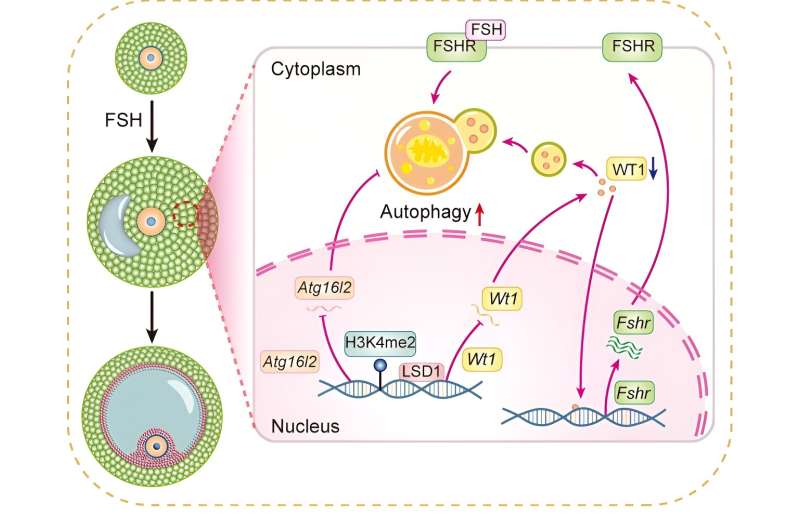This article has been reviewed according to Science X's editorial process and policies. Editors have highlighted the following attributes while ensuring the content's credibility:
fact-checked
trusted source
proofread
LSD1 promotes FSH responsive follicle formation by regulating autophagy and repressing Wt1 in granulosa cells: Study

A study published in Science Bulletin has been led by Prof. Chao Wang (China Agricultural University), Prof. Guoliang Xia (China Agricultural University) and Prof. Fengchao Wang (National Institute of Biological Sciences).
The reasons the majority of growing follicles are programmed to undergo atresia while a small portion of follicles survive and undergo ovulation are complex. Despite this, FSH is an important survival factor that leads to follicle survival during growing follicle development.
Given that granulosa cells' (GCs) autophagy is closely related to the remodeling of follicle cells during follicular development and that FSH regulates autophagy, this study provides new evidence proving that the effect of FSH on GC differentiation and autophagy during antral follicle formation is coordinated in a time-dependent manner by lysine-specific demethylase 1 (LSD1).
Conditional knockout of LSD1 in GCs resulted in significantly decreased antral follicle number and subfertility in females, accompanied by marked suppression of the autophagy in GCs. On the one hand, depletion of LSD1 resulted in the accumulation of Wilms tumor 1 homolog (WT1) at both the protein and mRNA levels. WT1 prevented the expression of FSH receptor (Fshr) in GCs and thus reduced the responsiveness of the secondary follicles to FSH induction.
On the other hand, depletion of LSD1 resulted in a suppressed level of autophagy by upregulation of ATG16L2 in GCs. This study finally approved that LSD1 contributed to these sequential activities in GCs through its H3K4me2 demethylase activity.
Therefore, LSD1 modulates the expression levels of key genes correlated to the differentiation of GCs, specifically repressing the transcription of Atg16l2, which inhibits autophagy, and Wt1, which represses FSH responsiveness, through its H3K4me2 demethylase activity in mice.
In conclusion, this study presents evidence demonstrating that LSD1 is a key epigenetic modifier that coordinates with FSH to promote antral follicle formation in mice by repressing the transcription of Atg16l2 and Wt1, which either inhibits autophagy or suppresses FSH responsiveness respectively in the GCs of mice.
More information: Zijian Zhu et al, LSD1 promotes the FSH responsive follicle formation by regulating autophagy and repressing Wt1 in the granulosa cells, Science Bulletin (2024). DOI: 10.1016/j.scib.2024.01.015
Provided by Science China Press


















